2022 MLB front office ratings: The AL West
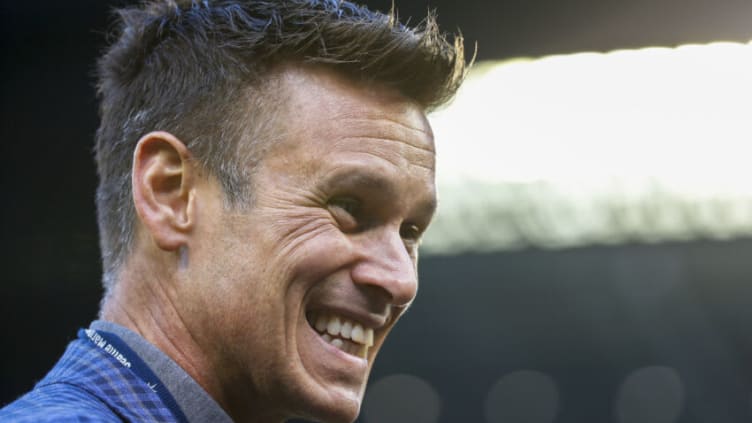
The Seattle Mariners ended their 21-year post-season drought thanks at least in part to some good work by the team’s front office and general manager Jerry DiPoto.
DiPoto’s tenure running the Mariners has been rocky and generally unproductive. But 2022 represented his best work yet, producing only the second positive impact on team fortunes since he took charge prior to the 2016 season.
The division champion Astros coasted on existing talent, but that base was good enough to bring Houston a fifth division title in six seasons. Elsewhere, front office moves were largely inconsequential, particularly in Anaheim and Oakland, which presented two of the four worst front office resumes of the season.
The analysis that follows is an assessment of the impact each AL West front office’s personnel decisions since November of 2021 have had on their team’s standing right now. It is based on the aggregate Wins Above Average of moves made in five areas:
- Players acquired by trade, purchase or waiver claim.
- Players signed as free agents or extended for more than one year.
- Minor league callups.
- Players lost via trade, waiver claim or sale.
- Players lost to free agency or released.
Wins Above Average is the preferred metric for this calculation because it is zero-based, meaning that it approximately reflects the number of games by which a front office either helped or hurt its team in the standings.
There was one change of significance to front office leadership in the division this season. But it occurred too late in the year to impact 2022 results. In Texas, long-time chief executive Jon Daniels was removed in August, leaving general manager Chris Young in full control.
Here is the AL West front office lineup as it impacted 2022.
Houston: James Click, general manager.
Los Angeles Angels: Perry Minasian, general manager.
Oakland: Billy Beane, executive vice president of baseball operations; David Forst, general manager.
Seattle: Jerry DiPoto, president of baseball operations.
Texas: Jon Daniels (president of baseball operations; Chris Young, executive vice president and general manager.
From best to worst, here’s an assessment of the work of the five AL West front office systems.
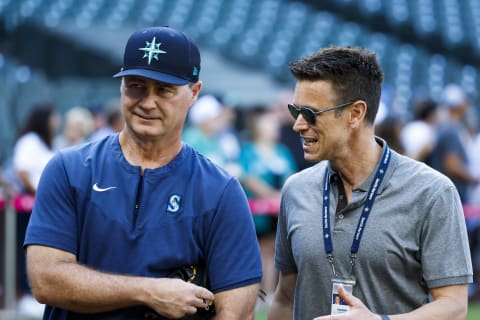
Jerry DiPoto, Seattle Mariners
Impact: +1.5
AL West rank: first.
MLB rank: eighth
In an effort to close the gap with Houston and end his team’s two-decade playoff-less streak, DiPoto made moves involving 48 major leaguers. Fifteen of those involved trades, two of them critical ones with Cincinnati.
A March trade obtained infielder Eugenio Suarez, who had been a disappointment in Cincinnati but who found his game in Seattle. Suarez hit 31 home runs with a .791 OPS, good for +1.9 WAR.
Then in August, DiPoto coaxed pitcher Luis Castillo away from the Reds. Castillo went 4-2 down the stretch, making 11 starts and awing the American League with his pure stuff. Statistically, that added another +0.5 WAA.
Collectively, DiPoto’s trade acquisitions were uneven, netting -1.7 WAA. The Suarez trade also saddled Seattle with Jesse Winker, who batted just .219, measuring out at -2.1 WAA. So there were ups and downs. That left Seattle mid-pack 16th in net trade impact.
Where DiPoto really made his impact, of course, was in his decision to promote Julio Rodriguez to the big club on opening day. Granted, any sentient human in DiPoto’s position would have done the same; he gets the credit. That credit amounted to +4.1 WAA, making Rodriguez the second most valuable roster addition – behind only Justin Verlander — for any team in 2022.
Thanks to Rodriguez’ Seattle’s rookie crop of nine produced a collective 4.5 WAA worth of value. That made it the second most valuable rookie crop in the game behind only the Atlanta Braves of Spencer Strider, Michael Harris, etc.
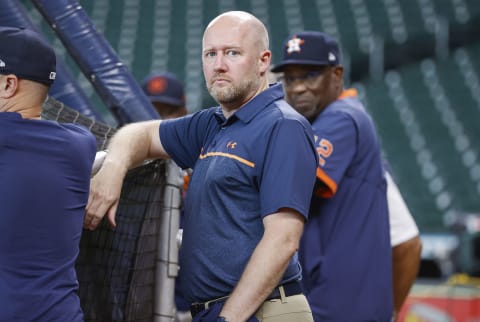
Jim Click, Houston Astros
Impact: -0.9
AL West rank: second
MLB rank: 12th
Click’s Astros breezed comfortably to the AL West title, seizing first place in mid-May and never relinquishing it.
This does not mean, however, that 2022 was an especially noteworthy season for the team’s front office. In fact, it was a pedestrian one.
The Astros were the fourth of five teams to qualify for post-season play without front office assistance, although in their case the harm done by Click and his staff was negligible, amounting to less than one game.
Click could thank his predecessor, disgraced GM Jeff Luhnow, for his comfortable situation. When he was fired in the wake of the sign-stealing scandal, Luhnow left behind contracts still in force or 2022 involving Jose Altuve, Yordan Alvarez, Alex Bregman, Yuli Gurriel, Lance McCullars, Martin Maldonado, Framber Valdez, and Ryan Pressly. It added up to +10.3 games worth of inherited WAA, the fourth most substantial inherited talent base in the game this season.
With that pat hand, Click played things close to the vest. The Astros personnel moves involved only 26 major leaguers, the fewest of any AL team and 14 fewer than any divisional foe That only six of those moves produced positive results for Houston didn’t, in the grand scheme of things, make much difference.
The big move, of course, was the March signing of free agent pitcher Justin Verlander, coming off surgery that had sidelined him since 2019. Whatever Click hoped for, Verlander exceeded it, producing a Cy Young worthy season: 18-4, a 1.75 ERA in 28 starts, all of that adding up to a +4.4 WAA. That made Verlander the most impactful addition to any team prior to or during 2022.
The loss of shortstop Carlos Correa to free agency, along with his 3.5 WAA, certainly hurt. But Click largely replaced that with rookie Jeremy Pena’s 2.9 WAA.
Pena was a large part of the reason why Houston’s rookie class ranked fourth in baseball for net value. Houston’s front office was 24th in net trade impact and – with the loss of Correa offsetting the Verlander signing — 14th in net free agent impact.
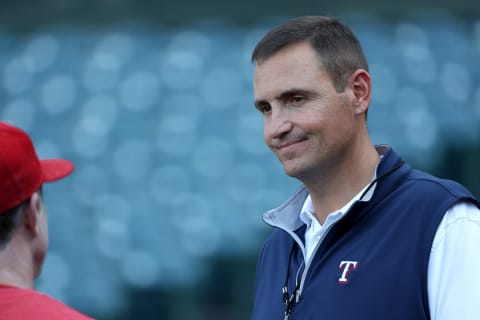
Chris Young, Texas Rangers
Impact: -1.8
AL West rank: third
MLB rank: 15th
The Rangers played aggressively in the pre-season free agent pool, signing infielders Corey Seager and Marcus Semien. Together that duo provided +5.4 WAA. But Young’s player acquisition work was too hit-and-miss to advance the team’s position.
Overall the Texas front office made 40 moves involving major league talent, 15 of which worked out positively and 24 negatively. That included 15 free agent buys, most of which were of a substantially lower profile than Seager or Semien.
A lot of that free agent activity involved trying to repair a bad pitching staff, and there were successes. Martin Perez and Jon Gray combined for a 19-15 record in 56 starts. Rookie Brock Burke provided a big lift in the bullpen, generating 1.4 WAA. They, however, were the exceptions.
Aside from Burke, the first-year class was a letdown. Texas used 11 rookies in 2022, nine of them coughing up negative values, the sum working out to -2.0 WAA.
Young also got picked pretty clean in his one-on-one dealings with other GMs. He acquired eight players through trade, sale, or waiver claim, at a net impact of -2.0 WAA. To get those eight he surrendered four major leaguers at a loss of another 1.7 WAA. That left Texas in 26th position for net trade impact.
Thanks to Semien and Seager, the Rangers did rank fourth in net free agent impact, but that disappointing rookie group left them 15th in that category.
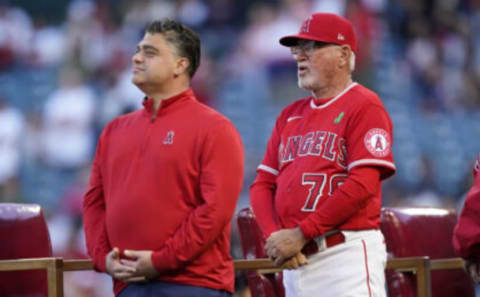
Perry Minasian, Los Angeles Angels
Impact: -9.7
AL West rank: fourth
MLB rank: 27th
In some quarters, this was supposed to be the season when the Angels finally amassed enough talent around Mike Trout and Shohei Ohtani to construct a winner. But hey, who are we kidding?
Second-year GM Perry Minasian’s moves shuffled 53 major leaguers in and out of Anaheim. But at 17 favorable and 33 unfavorable, the ratio was two-to-one against the Angels. When all the accounting was done, only the woeful Pirates, Nationals, and Athletics did a worse job of reconstructing their team than Minasian’s front office.
Begin with the trade market. Minasian played it aggressively, acquiring a dozen new faces in deals with other teams. Most, however, were fringe elements – how much do you really expect from Mickey Moniak, Rob Zastryzny, or Phil Gosselin – and none impacted the Angels more positively than +0.4 WAA. The net impact was -5.2 games in the standings.
Fortunately, those players came at no greater cost than outfielder Brandon Marsh. Still, the Angels ranked 27th in MLB for net impact from trades.
Things didn’t go much better in free agency. Again Minasian was active, signing or extending 21 new faces, some of them celebrated. Noah Syndergaard was picked up from the Mets’ trash heap, going 5-8 before a deadline deal sent him to Philadelphia. Veterans Aaron Loup, Raisel Iglesias, Archie Bradley, and Ryan Tepera were brought in to help the bullpen.
Still, the totality of those signings worked out to -6.6 WAA, leaving the Angels 25th for net free agent impact.
One might have hoped that the carryover impact of stars such as Ohtani, Anthony Rendon, and Trout would have been enough to make the Angels relevant. Indeed, Minasian began the season with inherited contracts that would produce +11.9 WAA, almost all of it represented by Ohtani and Trout. Two seasons into his tenure, however, he has been unable to build on the nucleus left behind by his predecessor, Billy Eppler.
An illustration of that reality. The 2022 impact on the Angels of players added by Minasian in his first season, 2021, was -2.4 games. Only five front offices in MLB derived less 2022 value from their own previous-season signings.
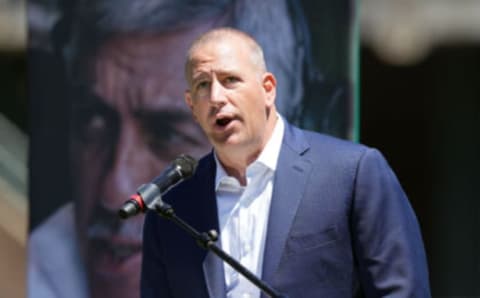
Billy Beane and David Forst, Oakland A’s
Impact: -23.8
AL West rank: fifth
MLB rank: 30th
Facing yet another budget-driven rebuilding effort – a practice with which they have become familiar – Beans and Forst took to it with vigor. They dispatched productive assets Chris Bassitt, Matt Chapman, Matt Olson, Sean Manaea, and Frankie Montas, bade farewell to veteran Mark Canha, and replaced them with either unproven prospects or proven journeymen.
Statistically, the result was the worst takedown of a franchise in a quarter century, the second worst in 100 years, and the seventh worst in the game’s storied history. The full list of more destructive front office takedowns consists largely of teams you’ve never heard of: the 1884 Cleveland Blues and Detroit Wolverines, the 1890 Pittsburgh Alleghenies, the 1899 Cleveland Spiders, the 1915 Philadelphia Athletics, and the 1998 Florida Marlins.
Beane and Forst made 60 moves involving 2022 major league personnel, but only 12 of those moves produced a positive impact on the Athletics; 45 were negative. The losses of Bassitt, Chapman, Canha, Olson, et al were predictably costly, so let’s focus on their replacements. Those included:
- Sheldon Neuse, a March waiver pickup: -1.8 WAA.
- Jed Lowrie, a 2021 player re-signed as a free agent in March: -1.8 WAA
- Pitcher Adam Oller, acquired from the Mets for Bassitt in March: -1.7 WAA.
- Pitcher Zach Logue, part of the march Chapman trade with Toronto: -1.7 WAA.
- Outfielder Cristian Pache, who came over from Atlanta in the Olson trade: -1.5 WAA.
And so it went. The Athletics ranked last among all major league teams in net trade impact, last in net free agent impact, and 23rd in net farm system impact. The team leaned on 11 first-year players, of whom one – pitcher Zach Jackson, +0.5 – produced a positive contribution.
Next. Ranking the front offices of the AL Central. dark